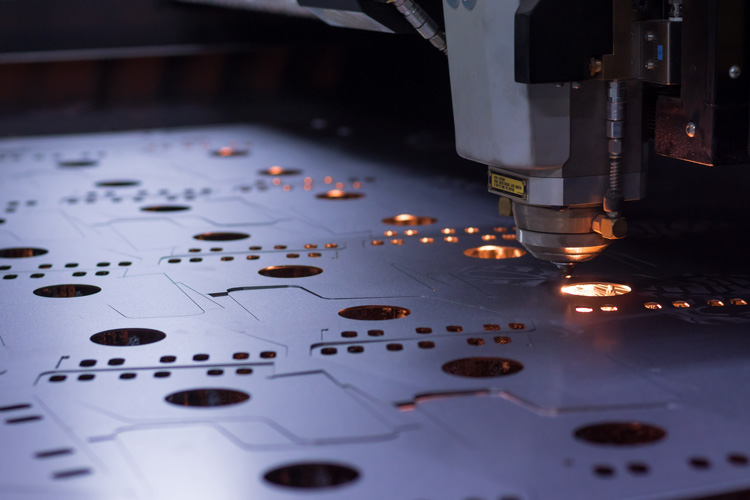What is Sheet Metal?
Sheet metal is defined as any type of metal that can become flattened pieces with a variety of thicknesses. This is one of the fundamental forms of metalworking. Sheet metal fabrication is a form of the subtractive manufacturing process to create a desirable and usable part. During this process, mechanical, water, or laser machines remove sheet metal’s material. Typically, machinists use stainless steel or aluminum but can also include alloys, carbons, and galvanized steels.
Machinists use Aluminum for its resistance to rusting and also working extremely well with other machining methods. Although workers use aluminum is more, stainless steel is known for being extremely durable by being able to withstand exposure to acid, rain, salt, and other extremely difficult elements without damage.
By using Computer Numerically Controlled (CNC), sheet metal fabrication uses CAD software to provide input for the fabrication tool. Software simulation also generates a toolpath of the part’s shape. The part is then cut by using a laser to burn holes through the metal. This allows the sheet metal to be as accurate as possible for the customer.
With the variety and dependability, sheet metal plays an important role in the construction, aerospace, automotive, and manufacturing industries. You can find this metal in truck and airplane bodies, the ducts and gutters of homes, medical tables, and many more products. These parts are involved in society so much, that you could walk by a sheet metal object and not even notice. What makes this material so vital for all of these industries are these benefits:
Benefits of Sheet Metal
- Strength– depending on the metal and the grade, bridges use steel sheet metal to support a bridge during heavy traffic.
- Durability – after fabrication, chemicals that prevent corrosion treat sheet metal. Chemicals include; zinc plating, nickel plating, anodizing, tinning, dip and power coating, and screen printing.
- Easily Transportable– due to sheet metal being relatively lightweight it is easy to transport and deliver. Depending on the size and type of metal, a squared foot of sheet metal can weight between .250 and 10 lbs.
- Malleability– with sheet metal being in the form of a flat sheet, it is able to bend into any form. This makes it perfect to use for a wide variety of parts.
- Repairable – welding can easily repair sheet metal.
- Availability – sheet metal is available globally. This is due to the fact that many kinds of metals can make sheet metal.
- Cost-effective – sheet metal is relatively inexpensive as it is not rare.
- Quality – sheet metal is of high quality.
- Quick – lead times on sheet metal fabrication are usually short. Parts Badger specializes in this just by sending a rapid quote.
- Adaptable – sheet metal fabrication can handle both low and high-volume production.
- Finishes – depending on the metal they use, sheet metal offers various finishing options.
- Fabrication processes – different fabrication methods are possible with sheet metal.
Types of Sheet Metal Fabrication Operations
- Shearing
- Blanking & Fine Blanking
- Punching
- Piercing
- Perforating
- Slotting
- Notching
- Bending
Aluminum Sheet Grades
- 1100-H14 Aluminum
- 3003-H14 Aluminum
- 5052-H32 Aluminum
- 6061-T6 Aluminum
Steel Sheet Grades
- 304 Stainless Steel
- 316 Stainless Steel
- 410 Stainless Steel
- 430 Stainless Steel
At Parts Badger, our sheet metal fabrication services provides a fast and cost-effective solution that can make any part from 3D CAD files or engineering drawings. Parts Badger offers a range of services. we are excited to help you out with any part requests. If you have a part that you would like to create out of sheet metal, please complete your new quote. If you have any questions, please feel free to contact us at (331) 223-4378 or click here.


Recent Comments